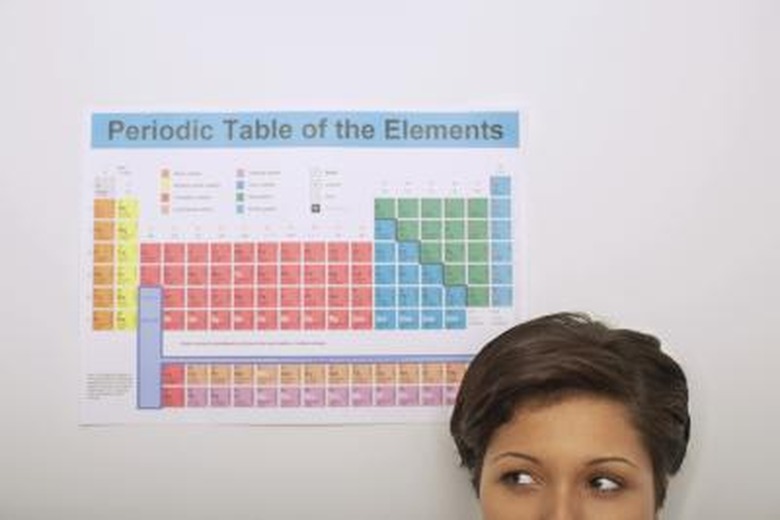Words You Can Make Using The Periodic Table
The periodic table of elements was first created by Dmitri Mendeleev in 1869. Mendeleev realized that by arranging the elements such that each had a higher atomic number than the one to its left, and similar properties with those in its same column, he could reveal essential truths about the structures of the elements.
Few schools today ask students to memorize the periodic table. But a simple game of creating words using the elements is a good way to help students remember the elements and their symbols.
One-Letter Elements
One-Letter Elements
There are 14 elements whose symbol is only one letter: hydrogen (H), boron (B), carbon (C), oxygen (O), nitrogen (N), potassium (K), fluorine (F), vanadium (V), yttrium (Y), iodine (I), phosphorus (P), sulfur (S), uranium (U) and tungsten (W). Given that this represents more than half the alphabet, there are a great many words that can be spelled from these elements alone.
One-letter elements is a great introduction to spelling words from element symbols. Have students start with words like SHIP (sulfur, hydrogen, iodine, phosphorus), SOUP (sulfur, oxygen, uranium, phosphorus) or WISH (tungsten, iodine, sulfur, hydrogen). From here, have them create longer and more complicated words. Consider making a competition of who can make the longest word.
One- and Two-Letter Elements
One- and Two-Letter Elements
The exercise gets more difficult when you try to work in elements with two-letter symbols. Again, start off simply by combining the letters representing lithium (Li), nitrogen (N) and potassium (K) to make the word "LiNK." Or combine sulfur (S), Tantalum (Ta) and Boron (B) to form the word STaB. Then have students work on their own examples.
Make words longer by adding suffixes. For example, you can take the letters that represent the elements, titanium (Ti), oxygen (O) and nitrogen (N) to create the suffix "TiON."
Two-Letters Only
Two-Letters Only
The most difficult way of leading this exercise is by using only elements with two-letter element symbols. Challenge students to make the longest, most complicated words they can. A word like "NiCeTiEs" (nickel, cerium, titanium, einsteinium) is a good example to show that such words are out there.
Cite This Article
MLA
Guzzardi, Will. "Words You Can Make Using The Periodic Table" sciencing.com, https://www.sciencing.com/words-make-using-periodic-table-5474752/. 24 April 2017.
APA
Guzzardi, Will. (2017, April 24). Words You Can Make Using The Periodic Table. sciencing.com. Retrieved from https://www.sciencing.com/words-make-using-periodic-table-5474752/
Chicago
Guzzardi, Will. Words You Can Make Using The Periodic Table last modified March 24, 2022. https://www.sciencing.com/words-make-using-periodic-table-5474752/
